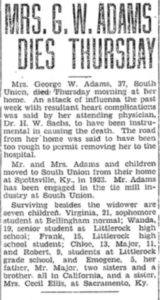 Just under a month ago, I wrote a post called Using newspapers to fill in the blanks in which I was very enthusiastic about newspapers and the discoveries they might contain. I still am.
Just under a month ago, I wrote a post called Using newspapers to fill in the blanks in which I was very enthusiastic about newspapers and the discoveries they might contain. I still am.
A week before that, I wrote a post called Those Eureka! moments, in which I described finding a newspaper article that confirmed that a family I’d been researching was indeed related to me.
Newspaper research can be so fun and rewarding. But here’s a friendly reminder: Just because it’s in the newspaper doesn’t make it true.
Case in point: The article I described in the Eureka post did indeed provide the link I needed, which I have verified. But it also had a wrong cause of death for Mrs. G. W. Adams (Elizabeth Major Adams, 1889-1929). The article says she died of “an attack of influenza…with resulting heart complications.” Her death certificate, by contrast, says she died in childbirth. And cemetery records listing a single grave with “Elizabeth and Baby Adams” substantiate that information.
Why the newspaper said she died of influenza, I don’t know. But it’s a reminder that double checking facts in newspaper articles (or at least taking those facts with a grain of salt) is a good idea.

Good advice. In my husband’s family, a newspaper obit misstated the cause of death for one woman because the family didn’t want to say out loud that the cause was cancer, specifically uterine cancer. Everyone in the family knew it was cancer, but the C word (especially in connection with female insides) wasn’t something they could bring themselves to put in the newspaper. Makes things tougher for genealogists!
Yes it does! Thanks for sharing, Marian.
After my mother died my sister was throwing out papers from my mother. Lucky I was there and took them. Several years later i started to go through the letters & papers. Folded and in a small prayer book was a clipping from the Rocky River Newspaper. The article stated that three children were attacked by the Axe-man. The Axe-man was the mail carry in the area and did not like the three children my mother, my uncle, and a neighbor child. My mother were said anything about this. Just another interesting fact in the life of my family. All because it was in the newspaper.
Wow, Bill. That’s quite a story. It’s amazing that your mother said anything about it. I’m glad your sister didn’t throw out those papers! Thanks for commenting.
Newspapers are indeed an important source of information – that’s how I learned of my great-grandfather’s brush with death and the death of my great-grandmother’s brother in a hotel in New York from carbon monoxide poisoning from a burst pipe. They were staying there before getting on a ship to visit the “old country.” On the other hand, they can also be the source of misinformation. My grandfather’s obituary misstates his immigration date by about four years, and then there’s the obituary I found recently of the husband of a cousin of mine. They were in a bad car accident in 1960 in which my cousin was killed. They had two small preschool-age children. According to his recent obituary, he had remarried, but the obituary never mentions his first wife and it reads as though his second wife is the mother of his two children. It’s like my cousin never existed. I thought that was very sad.
In my 35-year-plus career in newspaper journalism, I often dealt with grieving families who wanted their loved ones’ obits written “just so.” The oddest one I ever encountered involved the children of the deceased from his first marriage and another batch of children from his second marriage. They were fighting tooth and nail and could not agree on wording for the obit. Neither group wanted the other mentioned. They wound up running two different obits for the same man — and even holding two separate funerals!
Wow! That’s quite a story, Jayne. Thanks for sharing.